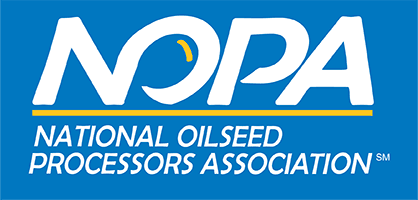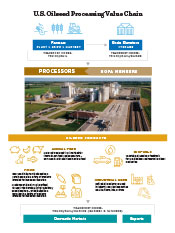Oilseeds such as soybean, canola, flaxseed, safflower seed, and sunflower seed are processed to create value-added products for food, feed, fuel, and industrial use products. Oilseed processing is done by solvent extraction. Multiple steps are taken to remove the hull, flake the meal, extract and refine the oil, and then process the remaining meal appropriately.
NOPA member processing facilities play a critical role in the oilseed industry value chain by connecting upstream agricultural producers with downstream consumers. NOPA members buy U.S. soybeans from U.S. farmers and create sustainably produced protein-rich products for domestic and international consumers.
Value-Added Products for Food, Feed, Fuel & Industrial Use
When it comes to soybeans, approximately 80% of the soybean is protein. Soybean meal is a high protein vegetable product used by animal feed millers, the soy protein industry, and increasingly, by consumer goods manufacturers as well as in industrial use applications.
Approximately 20% of the soybean contains oil. Soybean oil, the other processing by-product, is a vegetable oil used in cooking, baking, and frying, as well as in biodiesel production and the making of biodegradable plastics and adhesives. NOPA member products are transported via rail, truck, and barge to the end customer.
Co-Located Processing Plants & Refineries
Some NOPA members have co-located processing plants and refineries, which allows them to sell refined oil products directly to food processors and customers for frying and baking, as well as crude oil to biofuel refiners and industrial manufacturers.


